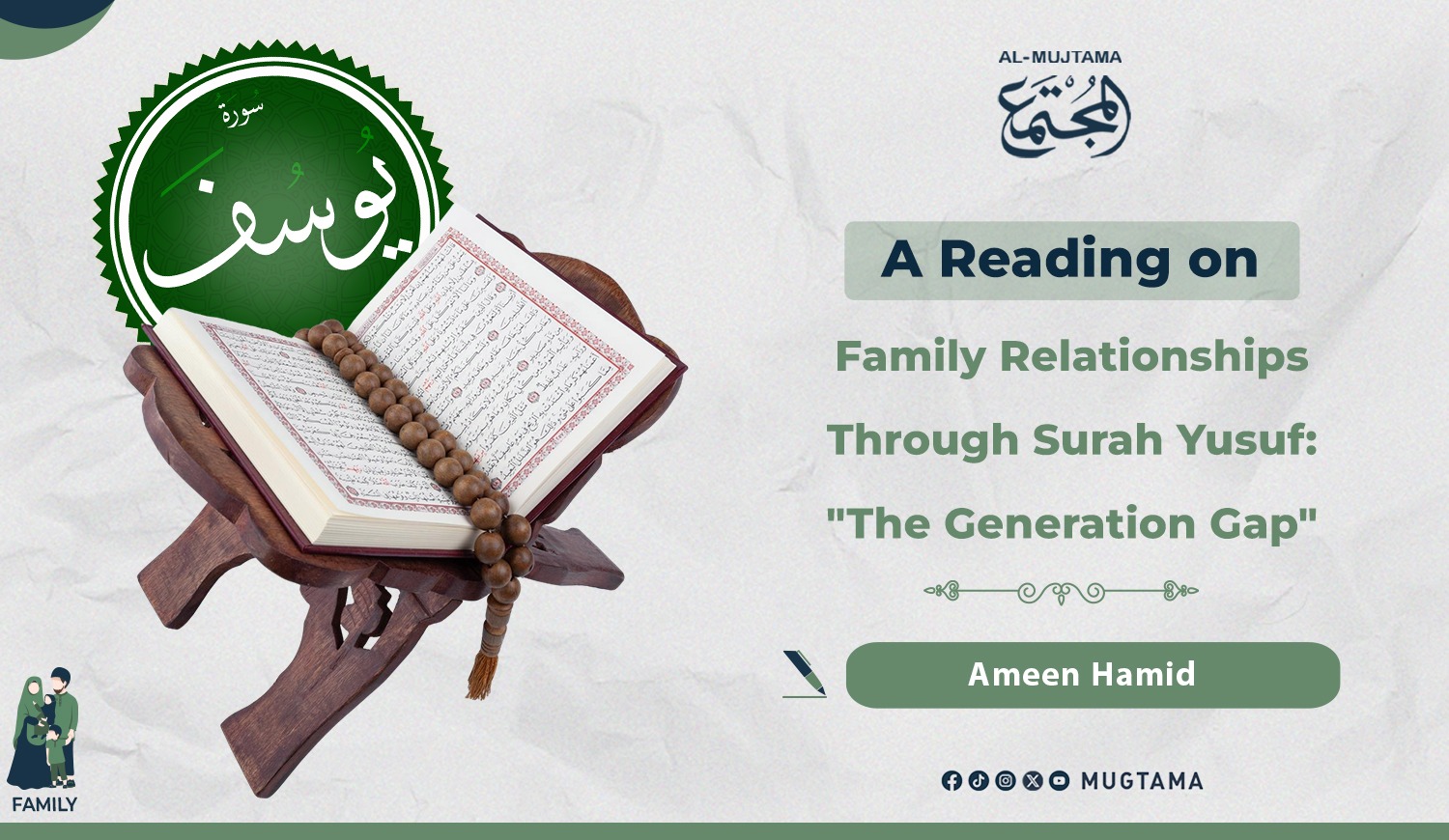Generation Gap
A Reading on Family Relationships Through Surah Yusuf: "The Generation Gap"

In the previous episode, we highlighted the concern for children that parents carry throughout their lives, a concern that never leaves them until they themselves depart this life with all its worries.
In this episode, we will discuss one of
the most complex issues facing both parents and children: the problem of the "Generation
Gap," a timeless dilemma felt by every father and mother as they try
to find the best ways to deal with their children. This issue is as old as time
itself, to the extent that the Greek philosopher Socrates is quoted as saying:
"Do not force your children to follow your footsteps, for they were
created for a time other than yours." (1)
We present Socrates' words to demonstrate
the antiquity of this dilemma, though we do not fully agree with his view, as
our Islamic civilization is built on the inheritance of beliefs, virtues, and
morals from generation to generation. Some scholars even said: "Ibn Mas'ud
resembled the Prophet (peace be upon him) in his guidance, manner, and
demeanor, and Alqamah resembled him, and Ibrahim resembled Alqamah, and Mansour
resembled Ibrahim, and Sufyan resembled Mansour, and Wakee' resembled Sufyan, and
Ahmad resembled Wakee', and Abu Dawud resembled Ahmad ibn Hanbal." (2)
Factors and Causes:
Writer M. Rawan Al-Hawamleh states:
"The 'generation gap' reflects differences in opinions, values, attitudes,
general perceptions of life, and relationships between the two generations,
especially between younger generations and older people. This is because each
generation grew up under specific circumstances and was influenced by its
experiences, the society it lived in, and the culture that characterized its
time." (3)
In light of this introduction, we can
shed light on aspects of this family dilemma through the relationship between
Prophet Jacob (peace be upon him) and his sons, as revealed in some verses from
Surah Yusuf. Let's begin by noting this scene that clearly illustrates this
relationship:
(They said, "O our father, why do you not entrust us with
Joseph while we are indeed his well-wishers? Send him with us tomorrow to roam
and play, and indeed, we will be his guardians.") (Yusuf: 11-12)
These two verses depict the cunning and
trickery that the sons hide beneath these affectionate words. They show that
the sons feel their elderly, kind-hearted father will not discover the deceit
behind their words. This is a scene that frequently recurs in the interactions
of children, especially during adolescence and youth, with their parents. When
dealing with their parents, they evoke the image of a poor, elderly father or
mother who can easily be fooled. Parents often fall for such "pranks"
that children meticulously prepare to get what they want.
In contrast to the stance of Prophet
Jacob's sons, we see his own position as he reveals to them his deepest fears
and heart's apprehension for Yusuf from his brothers' negligence. Negligence
was what the kind father most expected from the older brothers towards their
younger sibling. He said:
(He said, "Indeed, it saddens me that you should take him,
and I fear that a wolf would eat him while you are heedless of him.") (Yusuf: 13)
Not the Only Factor:
Naturally, we do not attribute the
temporal factor alone to the behavioral mistakes made by children when they
assume that parents are not intelligent enough to discover their tricks, no
matter how naive. There are undoubtedly many other factors behind the wrongful
acts that some may commit even with their peers, whom they know may surpass
them in intelligence.
However, we cannot ignore the hints in
the text that Jacob's sons felt this temporal gap, which made them imagine
their father (peace be upon him) was under its influence. They use expressive
phrases that portray their perception of their father as outdated, immersed in
dreams they believe time has surpassed:
(They said, "By Allah, you will not cease to remember
Joseph until you become weak with old age or are among the dead.") (Yusuf: 85)
(They said, "By Allah, indeed you are in your ancient
error.") (Yusuf: 95)
Bridging the Chasm:
The truth is that this issue is a
fundamental, not marginal, educational dilemma, especially since it is not
explicitly expressed so that it can be addressed when it arises. Instead,
actions are driven by its psychological effects residing in the subconscious
and unseen influences that govern the actions of children towards their parents
or even students towards their teachers. This is a troubling issue that
educational institutions, educators, parents, and mothers should pay great
attention to, in order to bridge the gap between themselves and those they are
raising. This will allow the waters of emotions and feelings to flow, and
doctrinal and devotional values and ethical heritage to seamlessly and easily
transfer from preceding generations to succeeding ones, so that educators can
close their eyes content about the future of their religion, their children,
and their homelands.
(1) See: "Ighathat Al-Lahfan"
(2/265), "Al-Milal wal-Nihal" by Al-Shahrastani (2/144).
(2) "Al-Bidaya wal-Nihaya"
(14/618).
(3) "Sharjah 24" website, from
an article titled: "Generation Conflict... Understanding the Causes and
Opening Doors to Solutions."
Keywords: Surah Yusuf / Generation gap











